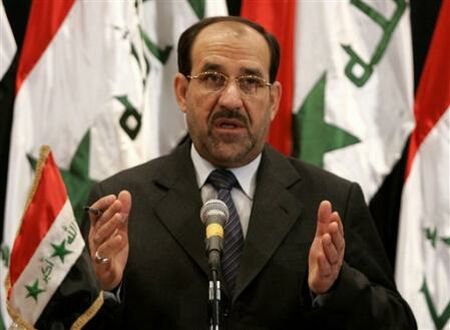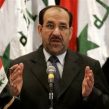
Latest Surge of Violence in Iraq Tests al-Maliki’s Government
Publication: Terrorism Monitor Volume: 7 Issue: 12
By:

These are challenging times for Nuri al-Maliki. Despite the victory of his coalition, the Dawlat al-Qanun (State of Law) in the provincial elections, al-Maliki’s government is facing major security threats and political unrest that could undermine his political authority before December’s general elections.
On the security front, Iraq has seen an outburst of violence with a series of at least 18 attacks in April. The twin bombing in the Shi’a shrine-city of Kazemayn was the deadliest of all, adding 60 people to a death toll of more than 150 in merely a week (al-Jazeera, April 24; Etemad, April 26). The recent string of attacks is reminiscent of the February 2006 Samarra shrine bombings that unleashed a wave of sectarian hostilities, bringing the country to the brink of civil war. With responsibility for the attacks being claimed by the Islamic State of Iraq—a coalition of Sunni militants with many foreign fighters—it may well be that a new wave of sectarian violence is about to overtake Iraq (al-Arabiya, April 24).
However, the insurgents’ strategy for carrying out the attacks is mostly political rather than sectarian. The violent incidents, mostly targeted at the Shi’a (including a failed attempt to assassinate Ayatollah Sistani), have also included attacks on members of the Awakening Council, a coalition of Sunni tribes receiving money from the government for fighting against al-Qaeda insurgents (Tabnak [Tehran], April 27; al-Jazeera, April 7, April 11). The Sunni insurgency also continues its assault against U.S. forces, which under the terms of the Status of Forces Agreement (SOFA) are required to withdraw from Iraq by the end of 2011. The first phase of the withdrawal from Iraqi cities is scheduled to be completed by June 30, 2009 (Tabnak, April 22). All in all, the attacks signal an all-out military assault by the insurgency to weaken the state ahead of the U.S. withdrawal.
On the political front, al-Maliki faces two other major challenges. The first is the rise of a loose coalition of pro-federalist and Sunni factions, known as the "153" bloc, which seeks to reverse al-Maliki’s political gains in the January provincial elections. The bloc challenges al-Maliki’s centralist policies which, according to some, recall the days of Ba’athist rule (Etemad, April 21). The election of the new speaker of parliament Iyad Samarrai, a major figure in the Sunni Islamic Party of Iraq with the backing of the pro-federalist Kurdish and ISCI (Islamic Supreme Council of Iraq) parties underlines the successful coalition-building which the anti-Maliki factions have carried out in recent weeks (Etemad, April 21).
Although much of their success should be credited to Maliki’s own failure to muster enough support after his provincial election victory, the 153 bloc was primarily formed in response to Baghdad’s increasing centralization policies, seen as a major threat by pro-federalist Kurds and the ISCI. The political struggle between the pro-federalist and centralist factions, which includes diverse groups like the secular Iraqiyya and the Shiite Sadrists, should also be viewed in parallel with al-Maliki’s attempt to limit the activities of the Awakening movement by arresting some of its leaders and fighters under the pretext that al-Qaeda has infiltrated the Sunni group (Azzaman, April 3; al-Jazeera, April 6). Al-Maliki’s anti-Awakening strategy has angered many Sunni members of parliament, who see this move as another attempt by the government to monopolize power (Azzaman, April 9).
More important opposition has come from al-Maliki’s own Shi’a constituency, groups that see his softer stance on Ba’athism as a sign of appeasement that will allow a revival of Sunni power (Etemad, April 21). Many Shi’a factions objected to al-Maliki’s earlier attempts to include the Ba’athists in the national reconciliation project. Even Ayatollah Sistani, a major backer of al-Maliki’s government, has indirectly criticized the Prime Minister for his failure to denounce Ba’athism (Tabnak, March 30). It is this opposition that has recently forced al-Maliki to shift his position and wage a new set of verbal attacks against the Ba’athists, accusing them of masterminding the latest string of violence (IRNA, April 8, 27).
Finally, there is Washington, where the new Obama administration has been less focused on Iraq due to its preoccupation with domestic concerns and an increase in security since late last year. The new administration’s perceived lack of involvement in Iraq has opened the political field in Baghdad to new contenders from many sides and factions, who perceive al-Maliki’s political power as being in jeopardy with the much anticipated departure of U.S. troops.
One positive observation can be made here. The unfolding political rivalry could open up a new chapter for the post-Ba’athist era—the formation of an autonomous Iraqi government that would need to undergo self-adjustment through internal conflict and cross-sectarian alliances between factions seeking to gain influence over the constituencies they represent. As a transitional stage in Iraq’s democratization (and a move away from sectarian politics), the latest political turmoil, therefore, should not be seen as a setback for Iraq, but as progress toward non-sectarian party politics.
The problem of security on the ground, however, could render such a transition incomplete. In the coming months leading to the elections, the key for al-Maliki’s regime is to contain the bloodshed by showing the government’s military strength against the insurgency while bringing to his side both pro-Awakening Sunni and pro-Sadr Shi’a factions that maintain considerable support in the eastern and south-central provinces. Amidst the unrest on the ground, the anti-Maliki parliamentary factions could continue to keep al-Maliki in check in order to curtail the total centralization of power prompted by an obvious response to concerns over security ahead of the American withdrawal. Of course, the success of such political tactics would depend on whether al-Maliki could maintain reasonable distance from Washington and appear self-reliant to Iraqis, who overwhelmingly support the U.S. withdrawal (al-Jazeera, April 10).





